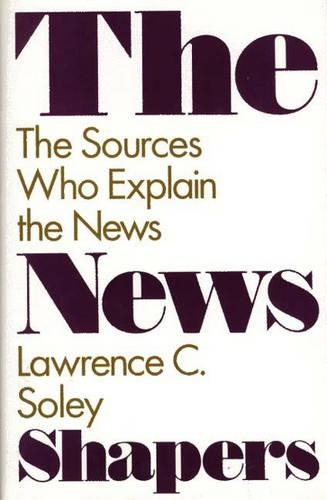
The News Shapers: The Sources Who Explain the News
(Hardback)
Publishing Details
The News Shapers: The Sources Who Explain the News
By (Author) Lawrence C. Soley
Bloomsbury Publishing PLC
Praeger Publishers Inc
20th April 1992
United States
Classifications
Tertiary Education
Non Fiction
Media studies: journalism
302.23
Physical Properties
Hardback
192
Description
Analysts, political scientists, scholars and consultants - this book describes the elite club of individuals that the media approach for "inside information", background or predictions concerning the outcome of still-unfolding stories. Although they are presented as detached experts, this book uncovers their long histories of partisanship as former government officials or politicians, and charges that most of the shapers have no better credentials than the millions of people to whom the news media never turn. This book's findings, which are based on an examination of three major networks' evening broadcasts between 1987 and 1988, reveal that a small number of white, politically conservative men associated with Washington-based "think tanks", former Republican administrations, and private, East Coast universities virtually monopolise political discourse in the mass media. Dispelling the myth of the media's liberal bias, this book discusses the shortcomings of both print and broadcast journalism which lead to selection of partisan news analysts, and the effects of their commentaries on foreign and domestic affairs. Special attention is given to Henry Kissinger, Washington's "think tanks" and the media's handling of the conflict with Iraq.
Reviews
. . . Solely provides useful descriptions of some of the nation's major think tanks, their personnel, funding and types of products, as well as interesting commentary on some former government officials.-ALBR
Soley is right: news organizations' reliance on experts'' to explain social processes and political problems has the adverse effect of eroding the need for democratic participation. This result is enough of a reason for journalists and consumers of news alike to take notice of this important book.-Journalism Quarterly
." . . Solely provides useful descriptions of some of the nation's major think tanks, their personnel, funding and types of products, as well as interesting commentary on some former government officials."-ALBR
"Soley is right: news organizations' reliance on experts'' to explain social processes and political problems has the adverse effect of eroding the need for democratic participation. This result is enough of a reason for journalists and consumers of news alike to take notice of this important book."-Journalism Quarterly
Author Bio
LAWRENCE C. SOLEY is Professor of Journalism at the University of Minnesota. He is the author of Clandestine Radio Broadcasting (Praeger, 1986) and Radio Warfare (Praeger, 1989), as well as numerous articles on political communication.
